Within the coastal marshes of southern Georgia, Corina Newsome feels most alive trekking through the tall, smooth spartina grass searching for seaside sparrow nests. Newsome is a graduate student at Georgia Southern University and her research focuses around the roles of climate change and predation on MacGillivray’s seaside sparrows. Although it has always been Newsome’s dream to study wildlife, she has been struggling with the knowledge that Ahmaud Arbery was killed down the street from her field site.
“Driving past that area I know what it feels like to be weary in the soul,” Newsome said. “Many emotions crossed my mind, but mainly I thought about how I’m out here studying sparrows, while Black people are getting killed in the same place. It feels like this is a privilege that I can even do this right now while there are people protesting, putting their lives on the line to fight for Black lives.”
In response to the killing of Ahmaud Arbery, and the racism Black birder Christian Cooper experienced in Central Park, Newsome jumped into action to help co-organize the very first Black Birders Week.
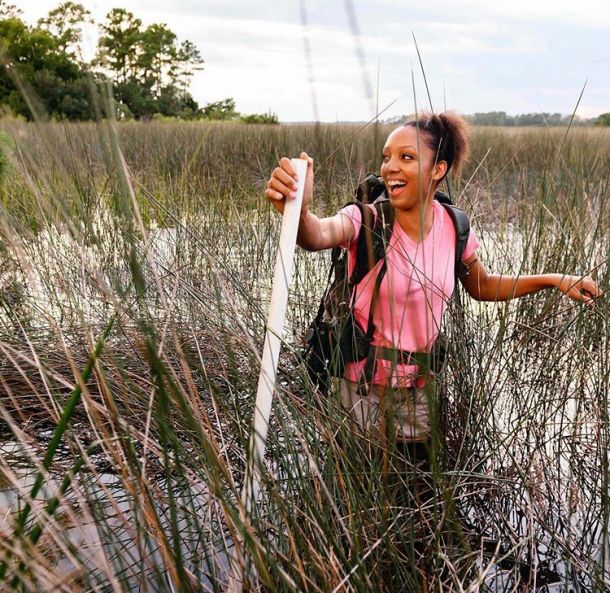
“The truth is that as Black birders, explorers, scientists, we can love what we do with every fiber of our being, and still be grieved to the core by the reality and context in which we are doing it,” Newsome described. Credit: Katherine Arntzen/Georgia Southern University
In addition to co-organizing this viral online movement, Newsome shares her thoughts on wildlife, social justice and diversity with her more than 60,000 followers on Twitter. Online she goes by the name Hood Naturalist in order to communicate science and promote diversity in biology and other STEM careers. She chose the handle “Hood Naturalist” because it speaks to her upbringing in Philadelphia, and to remind people that naturalists can come from anywhere, not just areas with access to an abundance of nature. During our interview, which has been edited and condensed, Newsome touched on the steps she took to become a biologist, the global impact of Black Birders Week, and how she thinks representation needs to change within fields to better support Black professionals.
Q: What experiences sparked your passion for the natural world?
Corina Newsome (CN): I think the first experience that I remember that got me interested as a kid was through looking at my dad’s wildlife encyclopedias. I was probably four or five years old. My grandmother also had a large collection of National Geographic magazines. So I was always pouring over those books. I grew up in Philadelphia, so I didn’t really have a lot of nature around me, but I was always looking at those magazines and pictures. I remember I wrote a note to myself about what I wanted to be when I grow up, I wanted to be a scientist who studies bugs and animals. That was the age I became obsessed with wildlife and tried to see as much as I possibly could. I actually watched some wildlife documentaries from PBS Nature too. This is a full circle moment! I remember sitting in front of the TV and PBS Nature being on because we did not have any other wildlife channels that you typically would have to pay for. I remember I always wanted to watch Channel 12 for PBS and PBS Nature.
Q: When did you become a birder? Do you have a favorite bird?
CN: So I went to college in Ohio at Malone University. One of the classes I had to take for my zoo and wildlife biology major was ornithology. I was actually really excited about all the other classes, mammalogy, herpetology, except ornithology. I really was dreading it because I knew absolutely nothing about native birds. I had learned a lot about exotic species, that were non-native because I was reading all those National Geographics, but I really was not looking forward to ornithology because I knew that I had heard from other students that we had to memorize almost 200 birds by sight and like 50 to 70 by sound. That sounded like a nightmare. So I get into the class and my professor whose name is Dr. Jason Courter, He was strangely passionate about it. I was kind of annoyed by his excitement until our first lab day, which is when we go out in the field.
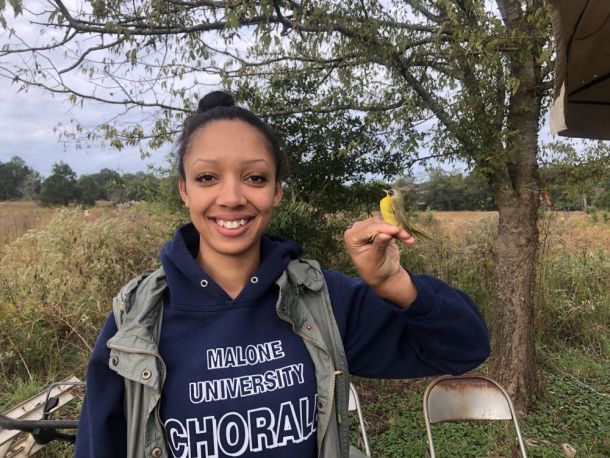
At a bird banding station run by Charlie Muise, Corina Newsome collects data on a Common yellowthroat found in Panola Mountain State Park. Credit: Antarius McLain
On the first day of lab, he was introducing us to some of the more common species in Northeast Ohio where our school was. He started off with the blue jay and I yelled in class. Everyone looked at me like I was crazy because blue jays are common. I had never seen one in my life. I had heard of a blue jay, you know, but what I pictured as a blue jay was probably more of an eastern bluebird type bird, not what I was seeing. Then sure enough, after the lab, I went back outside and they were everywhere. I thought that all the birds in North America would not be exciting or colorful. That’s originally why I was so scared to take the class. With the blue jay I realized there was so much diversity out there that I simply didn’t see because I didn’t know how to look for it. That’s when I really became hooked. I felt like, teach me all the birds so I can see all the birds!
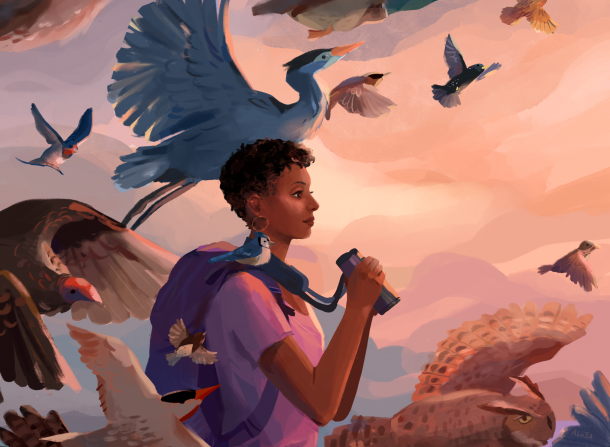
Corina Newsome surrounded by birds of North America, including her spark bird, the blue jay. Credit: Aliisa Lee
Q: Was sharing and appreciating the natural world part of your childhood?
CN: I garnered this fascination with wildlife in my childhood, but I was not really exposed to what a career studying wildlife would actually look like. The only thing I knew was veterinary studies. So all through elementary and middle school, high school, that’s what I geared myself towards. But one day my senior year of high school, I was at the animal hospital where I had been volunteering for five years. All of a sudden I just about passed out during a surgery, and it was a surgery I had seen over and over and over. I just became disgusted with surgery I couldn’t be in the same building. I panicked because I didn’t know any other career besides veterinary medicine, and I was in this state of disillusionment, what am I going to do?
A friend of my mom’s said he would introduce me to his sister, Michelle Jamison who works at the Philadelphia Zoo. I had never been to the zoo. I didn’t know what to expect. I figured the person I was being introduced to was Black, because my mom’s friend was Black. As a teenager, I thought she probably worked in concessions and could not help me. That was my assumption. I assumed that when he said ‘my sister works at the zoo,’ that she could not possibly be working with animals because all the people I saw working with animals on TV, in the books, everywhere was white. This made me realize how important representation is. This woman who worked at the zoo called me and she was like, ‘Hey, Corina. I work at the Philadelphia Zoo and I’m the lead carnivore keeper.’ She encouraged me to do an internship at the Zoo and she took me behind the scenes where she did her work. She showed me what her life is like, what she does and, and what its like conserving endangered species, through breeding, nutrition, research, all of this. That summer changed my life. If I had not met Michelle, I would not be doing this. Through her I was seeing a reflection of myself and what my future could look like. It was interesting because even after I started my internship at the Zoo and I learned about all these career options, it wasn’t until I saw her doing her job, that it clicked in my head that this career could be for me. Michelle was the last Black woman zookeeper, wildlife professional, that I saw in the formative years of my career. Even though I had loved wildlife up until that point, that experience at the Philadelphia Zoo changed my entire trajectory. I focused on wildlife biology from that moment on.
Q: What impact has Black Birders Week had on you?
CN: During Black Birders Week we started off with #BlackInNature. I’m talking about just hundreds and hundreds and hundreds of pictures that I saw of Black people studying the outdoors, exploring the outdoors. I have never in my life seen anything like that. Had I not seen that one person, Michelle, working in wildlife science, I wouldn’t be here. Many times, when I explain this there is a disconnect because white people have never had to look at a such a career and think, I don’t see myself represented here. To see the magnitude of other Black people, specifically doing the things that I love to do as well, it was just like the encouragement I didn’t know I needed. This magnitude, it reaffirmed that I belong. That I’m not alone in doing this. Even though I will probably be the only Black person in my physical space that I see, I know that I’m not actually alone. I remember one young woman. She is a Muslim woman and she posted a picture of herself with a couple of birds. I think for bird banding, maybe, but she was holding birds and another Muslim woman commented and said, ‘I’ve been a hijabi birder for over 20 years and this is the first time I’ve met a Black hijabi birder.’ That was so meaningful to her and meaningful to me to see that. There was also a man who is really big in the birding world, Dudley. He said in the 40 years he’s been doing this, he never thought he would see the day when he wasn’t the only Black birder he knew. I was floored by that. The most important part of the week was to reaffirm our belonging to each other.
Q: During Black Birders Week there were a lot of discussions about racism and interactions with the police, have you ever experienced any challenges or dangers when conducting fieldwork?
CN: I have not had any racist experiences or encounters with law enforcement in my birding or in my science. I always want to say that as a light skinned Black woman, my experience is very different than a dark skinned Black person or a dark skinned man, especially. I want to be clear about that because I have a huge advantage because of my complexion. I’m always cautious and there are certain things that just as a Black person I have learned to do. Even when I’m not even birding, the experience of being Black in mostly white spaces can be translated across many different experiences.
If someone is walking down the trail towards me and they are white, before I can even think about it I put on my binoculars. Sometimes I’ll put them up. Even if I’m not looking at anything, just to show that I’m doing something outdoorsy and not up to no good or something. When it comes to my research, there have been several times when I have changed my behavior. I do research in the coastal marshes of Southern Georgia. The social climate here is one that is inhospitable towards Black people. There are confederate flags everywhere. There’s a plantation museum by my field site that has horribly inaccurate depictions of slavery on their tour. You also see “All Lives Matter” signs, there are many people that are very anti-Black. So when I’m down there, I’m always on high alert because I assume the worst. I feel like I need to assume the worst about every person I encounter. My marsh site is adjacent to roads where people can drive, walk, or bike by. A couple of weeks ago I was out there and I was setting up a camera trap and I was carrying all this extra equipment visibly instead of having it in my bag, I had it on my body so that people could see what I was working on so they would not be suspicious. I just thought to myself “why am I doing this?” I have to do all these extra things just to make myself look non-threatening, and it makes doing my work an inefficient process for me. There were times when I’m out deep in the marsh where you can’t really see me necessarily, but I’ll be walking back. As I get closer, I’ll see somebody in a pickup truck pull up next to the marsh and just sit there watching me. What is this about? This happened more times than I can count. Every time this happens my stomach drops and I feel like this is going to be the time when something pops off that I’ve been avoiding or I’ve somehow not encountered. There is just a pit in my stomach until I get to the road. Since this coronavirus situation, I’ve had to do all my work alone, without a research assistant which has made me feel more exposed.
My advisor here at Georgia Southern has been incredibly supportive. Her husband even, he’s not my advisor at all, but he always offers to go with me to the marsh. He does not have the field skills to offer help with my research, but he’s a white man. He says, ‘If me being there will make you feel safer or supported let me know and I will come with.’ The reason why I keep going is more because I feel like I can’t stop. I feel like if I stop then I’m almost succumbing to the hate and being pushed out by white supremacy. I am at the end of my degree and I need to complete this to graduate. I’m sure if I asked my advisor, ‘Is there any way that my research question could be adjusted?’ She absolutely would. She has never insinuated at any point that if I had to take a break from field work or could not do this that I wouldn’t graduate. But I feel like I cannot stop for my own self, and to know that no one can stop me, I’m not going to be scared or forced out of what I want to do.
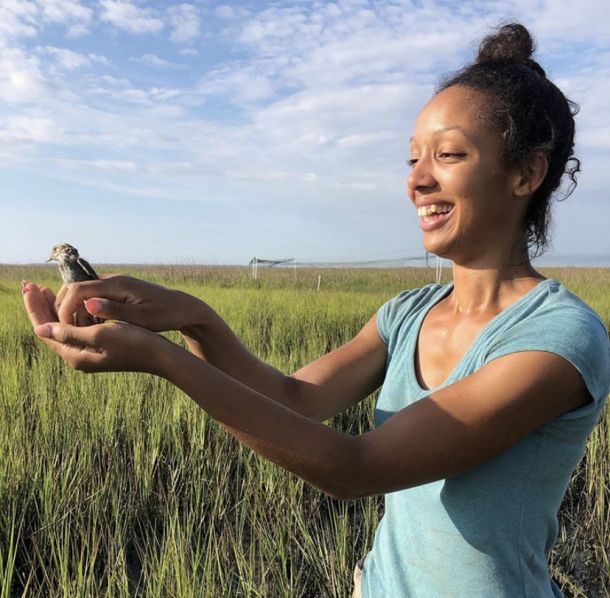
Corina Newsome releasing a Seaside Sparrow after bird banding. Credit: Kevin Loope
Q: In February, Ahmaud Arbery was shot and killed close to your field site in Southern Georgia. Can you walk me through some of the emotions you felt when you found out?
CN: One day a news article came up and it had a picture of the neighborhood where it happened. It’s called Satilla Shores. I pass this place every time I go to the marsh. Before I found out about Ahmaud I remembered thinking it sounded like a really pleasant place. There’s live oak everywhere and Spanish moss hanging. I thought it looked so peaceful and so nice. When I realized that’s where it happened, I was sick. Even though it looks like an area with a lot of natural beauty, it’s a life-threatening place for Black people. After I found out where it was that he got shot in this neighborhood, I did not want to go back to my field site. I have to drive past Satilla Shores to get to the site. To think that at one time this place felt like a refuge, a place where I could decompress and just breathe, and then this man was killed right here. I still don’t even know how to deal with those thoughts and emotions.
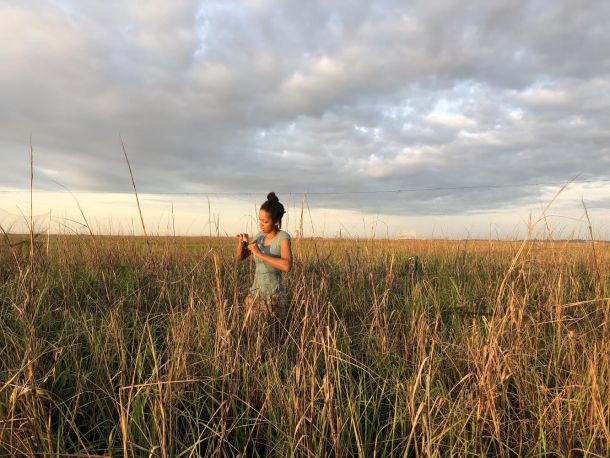
Corina Newsome banding seaside sparrows at her field site in Brunswick, Georgia. Credit: Elizabeth Hunter
Once, I drove around the neighborhood and before I pulled out, I rolled the windows down and screamed at the top of my lungs because I felt like there was something inside me that I just had to get out. I drove the rest of the way down the road to my field site and I just sat on the edge of the marsh, weeping. Driving past that area I know what it feels like to be weary in the soul. I felt like I could disappear, as if I had no strength to do anything. Many emotions crossed my mind, but mainly I thought about how I’m out here studying sparrows, while Black people are getting killed in the same place, they are getting hunted down. It feels tone deaf for me to be out here studying sparrows while my people are getting murdered. It feels like this is a privilege that I can even do this right now while there are people protesting, putting their lives on the line to fight for Black lives. I felt guilty and I felt sick by being there, and every time that I’ve gone out, I’ve cried before I go into the marsh. I want Black people to be in these spaces, I want us to be doing the science and I want us to be represented, but I don’t want any Black person here. I don’t want any Black person to have to drive past a place where a Black man got hunted down and killed. I would never tell a Black person to come work down here. That feeling is overwhelming and it’s complex.
Q: Could you tell me more about some of the changes you would like to see within the environmental space to better support Black STEM professionals?
CN: I think there are several barriers that keep Black people and other marginalized communities out of the field. Lots of structural changes have to happen in different industries including in advertising. That is huge because seeing someone like me, even as an adult professional in the field is empowering to me and I wouldn’t be here unless I saw someone like me at some point. Organizations need to be very intentional about using advertising that reflects the demographics of the United States, not just white people, or the demographic who has traditionally held power over the natural resources of this country. When it comes to getting into the profession, a lot of careers, including zoo keeping, you have to have experience. When it comes to wildlife conservation, a lot of the time you have to work for free, and that automatically filters out anyone who cannot afford to work for free, which is most people from oppressed groups.
A lot of Black people cannot afford to work for free. The only reason I’m here is because my internships happened to be down the road from where I live. So it was close and my mom and grandma sacrificed so that I could pursue this career. You need to pay people to get experience. You cannot have these required, free learning experiences for years on end. That’s not cool. It definitely undermines any diversity initiative. I think that the spaces themselves, particularly in wildlife conservation, should not be thought of or maintained as neutral places because conservation, first of all, it’s not a neutral career path. You’re dealing with human lives, every element of conservation involves communities, someone’s going to be affected by the policy you put in place. When injustice has happened, do not make your space a place where that cannot be talked about. In a lot of these birding groups that I was in online, or that I saw online, a lot of people were taking our posts down and refusing to let us advertise Black Birders Week because they thought it was too political. But this is my existence, this is my story. This has nothing to do with politics. We were silenced in a lot of spaces and that’s been the case for a long time. You can’t silence people’s voices because it makes you uncomfortable, or challenges your worldview, or challenges the worldview of the people around you.
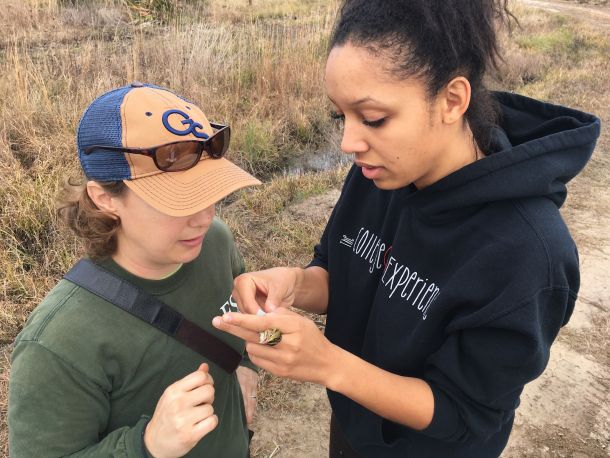
Corina Newsome bird banding a Henslow’s Sparrow with her advisor. Credit: Kevin Loope
